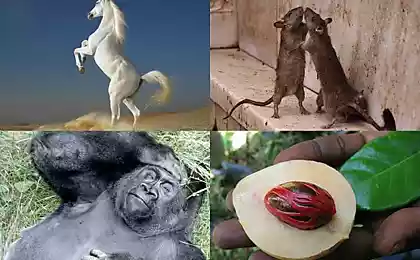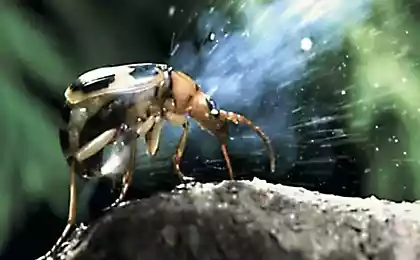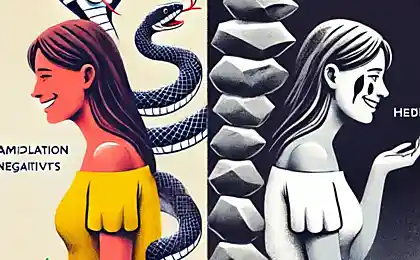163
Mangobey and the gorilla – an amazing friendship
These remarkable photos, taken at Dublin zoo in Ireland, reveal the friendship between an African red-headed mangobe and a three-year-old western lowland gorilla. This is something you will never see in the wild, the zoo said.
Photo: Fran Veale / Dublin zoo
Mangobey, who recently arrived at an Irish zoo, seems to be whispering something in his new mate's ear. According to the caretakers, these monkeys became friends so quickly that now they can not be poured with water.
“We were very excited to see how different species of monkeys get used to each other and build relationships,” said Helen Clarke Bennett, senior director of African primates. The main thing in this relationship is still a very young gorilla, showing a special interest in the new inhabitant.
Gorillas are very curious animals. They are attracted to everything new and unknown. They are always ready for a new acquaintance and quickly adapt. We had no idea that such different monkeys were capable of such a warm relationship. We tried our best to make these monkeys comfortable, explains Helen.
While these monkeys are still young, they will live in the same enclosure, but over time they will be separated. As soon as there are more mangobees in our zoo, we will definitely transfer this monkey to his relatives. In the meantime, let them live together.
The African red-headed mangobei, or white-collar mangobei (Latin Cercocebus albigena) is a mammal from the genus Mangobei, the marmoset family (Latin Cercopithecidae). Red-headed mangobees are found in Cameroon, Nigeria, Equatorial Guinea, Gabon and Congo. They lead a woody lifestyle, but sometimes they come down to the ground in search of food.
This mangobey arrived at the Dublin Zoo as part of a special European conservation programme for rare and endangered species. This species is on the verge of extinction due to habitat loss and hunting for them by the local population. It is listed by the International Union for Conservation of Nature (IUCN) as a vulnerable species.
Source: zoopicture.ru
Photo: Fran Veale / Dublin zoo
Mangobey, who recently arrived at an Irish zoo, seems to be whispering something in his new mate's ear. According to the caretakers, these monkeys became friends so quickly that now they can not be poured with water.
“We were very excited to see how different species of monkeys get used to each other and build relationships,” said Helen Clarke Bennett, senior director of African primates. The main thing in this relationship is still a very young gorilla, showing a special interest in the new inhabitant.
Gorillas are very curious animals. They are attracted to everything new and unknown. They are always ready for a new acquaintance and quickly adapt. We had no idea that such different monkeys were capable of such a warm relationship. We tried our best to make these monkeys comfortable, explains Helen.
While these monkeys are still young, they will live in the same enclosure, but over time they will be separated. As soon as there are more mangobees in our zoo, we will definitely transfer this monkey to his relatives. In the meantime, let them live together.
The African red-headed mangobei, or white-collar mangobei (Latin Cercocebus albigena) is a mammal from the genus Mangobei, the marmoset family (Latin Cercopithecidae). Red-headed mangobees are found in Cameroon, Nigeria, Equatorial Guinea, Gabon and Congo. They lead a woody lifestyle, but sometimes they come down to the ground in search of food.
This mangobey arrived at the Dublin Zoo as part of a special European conservation programme for rare and endangered species. This species is on the verge of extinction due to habitat loss and hunting for them by the local population. It is listed by the International Union for Conservation of Nature (IUCN) as a vulnerable species.
Source: zoopicture.ru






















